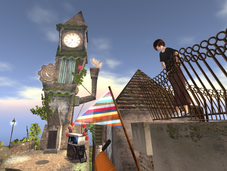
This week's topic is one I'm very familiar with--the role of thinking in the classroom. I work at an IB-PYP campus, and we are all about inquiry and HOTS--higher order thinking skills. I see the many times I ask my students "Why?" on a daily basis as payback for all the toddlers I've worked with in my career, including my own children. I enjoy watching my students' brains at work, seeing their squished up faces as they struggle to explain an answer, dig deeper for reasons, form an educated opinion. In many cases, students in my special education classroom are unused to being pressed to think, and they try to wait me out, to see if I'll pass over them and go on to the next student...but that doesn't usually happen in my room. In small group instruction, I have the advantage of wait time that my colleagues in larger settings often don't have--and so I press my students to think, to answer, to take risks. Some of them are just now, after twelve weeks, becoming comfortable to take that leap, but most will rise to the expectation by the end of the year.
As a librarian, I am looking forward to spurring inquiry in the minds of the learning community. I want to have books, displays, realia, bulletin boards, and a web presence that invites students and staff to explore the curriculum as well as their personal passions, and I want to help teachers do the same in their classrooms. I want to have quiet spaces for thinking in the library, and methods to show thinking that span multiple intelligences. I want to model my own "units of inquiry", things that I'm curious about and learning. I want to help create, as Dr. Ron Ritchhart has coined, a "culture of thinking" in my library and my school.
As a librarian, I am looking forward to spurring inquiry in the minds of the learning community. I want to have books, displays, realia, bulletin boards, and a web presence that invites students and staff to explore the curriculum as well as their personal passions, and I want to help teachers do the same in their classrooms. I want to have quiet spaces for thinking in the library, and methods to show thinking that span multiple intelligences. I want to model my own "units of inquiry", things that I'm curious about and learning. I want to help create, as Dr. Ron Ritchhart has coined, a "culture of thinking" in my library and my school.

 RSS Feed
RSS Feed